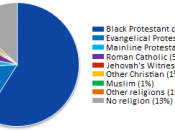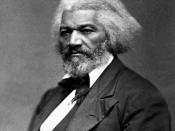By Lee A. Zito
1.Harriet Jacobs pulished under the psuedonym, Linda Brent. With pseudonyms she was able to protect herself, and the people within her book. If she had used her real name, it might have caused a huge controversy during the period in which she wrote. Jacobs had many anxieties on publishing her story. First of all her story was very personal, sharing your personal life with the masses can be very nerve wrecking. Second of all Jacobs was an ex-slave. She feared that this could influence readers, damaging her career as a writer, or even endanger her life.
When It came to feminism, Jacobs was ahead of her time. During the nineteenth century, the unspoken feminine code included piety, purity, submissiveness and domesticity. To Jacobs, these were absolutely impossible to follow. She had her own ideas about true womanhood, to which fought against sexual harrasment, exploitation, and suppression.
2.Slave narratives recast the American ideal of the "self-made man" to African Americans, because it is easier for both to relate to eachother. When you are reading something that you relate with, it is easier to understand where the author is coming from, because you too have been their before. For instance, Fredrick Douglass built onto and transformed the legacy of Benjamin Franklin, who's auidience was primarily white men like himself. Fredrick Douglass was able to take Franklin's virtuous feelings and ideas of humanity, but include the African American race as well.
3. Harriet Jacobs and Fredrick Douglass both share a relationship within their stories. Both authors had to fight the same fight, in escaping from lives of slavery. Jacobs may have borrowed and modified some of Douglass' conventions in her story, she does this to include to women as well. Jacobs, having a double predjudice...



Mccadden.....
nicely done. I KNOW we have had disagreements about each others work, but this is brilliant, p.s. im sorry bout that, Nicely done and im readin the others story.................. now. bye
5 out of 5 people found this comment useful.